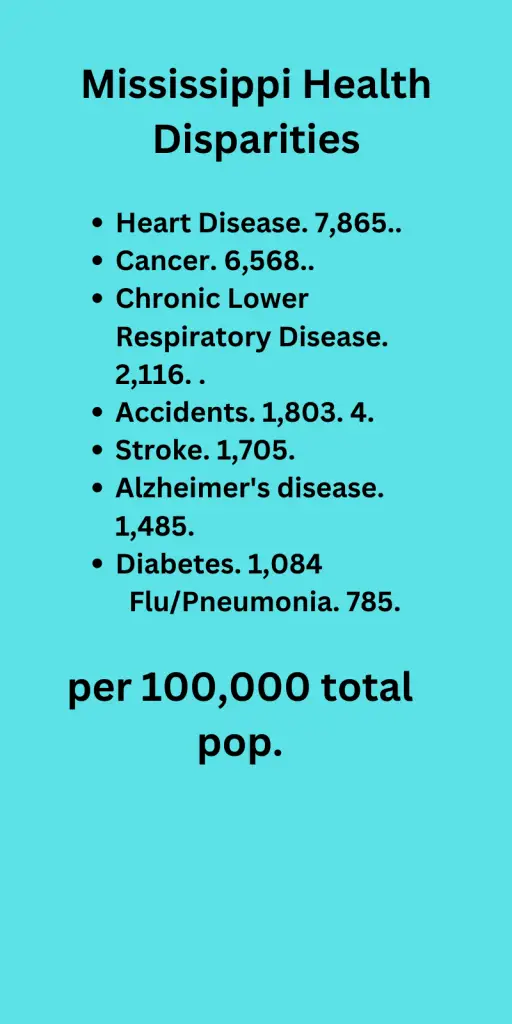The Impact of Health Disparities in Mississippi
Health disparities refer to the unequal health outcomes experienced by different groups of people. In Mississippi, these disparities are noticeable, affecting numerous people.
Some people might have more trouble staying healthy because of their income level, where they live, or their race. This leads to higher rates of disease, shorter lives, and other health problems.
Signs and Symptoms to see a Doctor
- Heart attack symptoms
- Chest pain
- Upper back or neck pain
- Indigestion
- Heartburn
- Nausea
- Vomiting
- Dizziness
- Shortness of Breath
- Pictures of swollen legs and ankles
Factors Contributing to Health Disparities in Mississippi
There are many reasons why health disparities exist in Mississippi. Some people can’t afford health care.
Some don’t live close to doctors or hospitals. Other people may not have a healthy lifestyle because they lack access to fresh foods or safe places to exercise. These are all contributors to the overall health disparities in the state.
Poverty and Income Inequality
In Mississippi, numerous people live in poverty. This means they might not have enough money for healthy food, safe housing, or regular doctor visits. Income inequality also plays a role, as those with higher incomes often have better access to healthcare and resources for healthy living.
Limited Access to Healthcare
Many areas in Mississippi are rural, meaning they’re far from hospitals or clinics. This makes it hard for people living in these areas to get the medical care they need. Also, some people might not have health insurance, making it expensive to see a doctor.
Lack of Healthy Food Options
Some neighborhoods, particularly in poorer areas, don’t have grocery stores that sell fresh fruits and vegetables. These areas, often referred to as ‘food deserts,’ make it difficult for residents to maintain a healthy diet.
Low Education Levels
Education can greatly impact health. People with lower levels of education might not know about the importance of regular doctor visits, healthy eating, and exercise. They may also have more difficulty navigating the healthcare system.
Social and Environmental Factors
Factors such as housing conditions, access to safe spaces for physical activity, and exposure to violence or crime can also contribute to health disparities. People living in neighborhoods with these challenges often face higher levels of stress and poorer health outcomes.
Racial Disparities
In Mississippi, racial disparities exist in health outcomes. For example, Black Mississippians have higher rates of chronic diseases like diabetes and hypertension compared to their white counterparts.
These disparities are often tied to systemic issues like racism, discrimination, and lack of opportunity.
Each of these factors plays a role in the health disparities seen in Mississippi. By recognizing and addressing these challenges, we can start to work towards solutions.

Understanding Social Determinants of Health
Economic Stability
Economic stability includes things like job security, income, and expenses. For example, people with stable, well-paying jobs are often healthier because they can afford things like good food and medical care.
On the other hand, people with low income or who are unemployed may struggle to afford these basics, negatively impacting their health.
Education
Education is a significant determinant of health. Higher levels of education are linked to better health, likely because education leads to higher income and job security. Also, education can help people understand health information and make better health decisions.
Access to Health Care
Having access to good health care is important for staying healthy. This includes being able to get to a doctor’s office or a hospital, and being able to afford medical care.
People who don’t have access to health care may delay getting help when they’re sick, leading to worse health outcomes.
Neighborhood and Physical Environment
Where you live also plays a big role in your health. For instance, living in a neighborhood with safe places to exercise, access to healthy food, and good air quality can help you stay healthy.
But not everyone has access to these things. Some neighborhoods, particularly those with low income, may lack these resources, which can lead to poorer health outcomes.
Social and Community Context
Being part of a healthy community can make a big difference to your health. This includes things like having social support, feeling safe in your community, and being treated fairly. People who feel isolated or who face discrimination may experience worse health outcomes.
Understanding these social determinants of health can help us find ways to improve health and reduce disparities. By making changes in these areas, we can create environments that promote good health for everyone.
Social determinants of health are conditions in the environments in which people live, learn, work, and play that affect a wide range of health outcomes. These can include things like access to good schools, safe housing, and job opportunities. When people don’t have these things, it can lead to poorer health outcomes.

Addressing Health Disparities through Policy Change
Policy change can help address health disparities. For example, laws can be made to ensure everyone has access to health care, no matter their income.
Policies can also encourage building grocery stores in areas that don’t have them, so people can buy fresh food. Making policies to create safe and accessible places for people to exercise can also help.
Promoting Health Equity in Healthcare Systems
Ensure Accessible Healthcare Services
One way to promote health equity is by ensuring that healthcare services are accessible to everyone, regardless of where they live or their ability to pay. This could mean setting up more clinics in rural or underserved areas, or offering affordable or free services to those who can’t afford them.
Improve Quality of Care for All
Healthcare systems should provide the same high-quality care to all patients, no matter who they are. This means that doctors and other healthcare providers need to treat all patients with respect and without bias.
It also means offering the same level of care, including access to specialists and advanced treatments, to all patients.
Cultural Competence Training for Healthcare Professionals
Healthcare professionals should receive training to understand and respect the cultural differences of their patients. This can help them provide better care and create a more comfortable and trusting environment for their patients.
Involve Communities in Decision-Making Processes
Communities can be involved in the planning and development of health programs. This means letting community members share their thoughts on what kinds of health programs they need. By including them in the process, we ensure the programs created are suited to their unique needs and circumstances.
Representation in Health Committees
Community members can have a seat on health committees or boards. This gives them a direct way to influence decisions about health policies and programs in their community.
Community Surveys and Feedback
Surveys can be used to collect feedback from the community about health services. This feedback can then be used to make changes or improvements. For instance, if a community survey reveals that people are having trouble getting to the doctor because of transportation issues, the healthcare system might respond by setting up a shuttle service.
Public Meetings and Forums
Public meetings and forums give community members a chance to speak up about health issues that matter to them. These can be used to discuss new health programs, address concerns, or gather ideas for improving health in the community.
Health Education and Training Programs
Community members can be trained to provide certain types of health services, such as first aid or health screenings. This not only improves access to these services in the community, but also allows community members to take a more active role in their health.
By involving communities in decision-making processes, we ensure that health programs and policies meet the needs of the people they’re meant to serve. This can lead to better health outcomes and a stronger sense of ownership and empowerment in the community.
Communities should be involved in decisions about their healthcare. This can help ensure that the services provided meet the needs of the community. It also empowers communities to take an active role in their health.

Use Data to Identify and Address Disparities
Collecting and analyzing data on health disparities can help healthcare systems identify where problems exist. Then, they can create strategies to address these disparities. For instance, if data shows that a certain group has high rates of a particular health condition, the healthcare system can develop programs to address that issue.
By implementing these strategies, healthcare systems can promote health equity. This can help ensure that everyone has the chance to live a healthy life, regardless of their background or circumstances.
Health equity means that everyone has a fair chance to be as healthy as possible. This can be promoted in healthcare systems by making sure everyone has access to the same level of care, no matter who they are or where they come from.
This includes making sure everyone can see a doctor when they need to, and that all doctors give the same level of care to all their patients.
Community-Based Interventions to Reduce Health Disparities
Communities can help reduce health disparities. They can create programs that help people eat healthy, exercise more, or quit smoking. These programs can be tailored to the needs of each community. For example, a program in a community with a lot of smokers might focus on helping people quit smoking.
The Role of Education in Bridging the Gap
Education can play a big role in reducing health disparities. When people understand what they can do to stay healthy, they’re more likely to make healthy choices. Schools can help by teaching kids about good nutrition and the importance of exercise. Adults can learn from community education programs, doctors, or online resources.
Health Literacy
Health literacy is the ability to understand health information and to make informed decisions about health care. By educating people about health topics such as nutrition, exercise, and the importance of preventive care, we can help them make healthier choices in their lives.
School-Based Health Education
Schools can play a vital role in educating children about the importance of maintaining good health. This includes teaching about balanced diets, the importance of regular exercise, and the dangers of substance abuse. Schools can also provide an environment that promotes healthy habits, such as providing healthy meals and opportunities for physical activity.
Community Health Education Programs
Community health education programs can help educate adults in the community about health topics that are relevant to them. This could include programs on managing chronic diseases, prenatal care for expectant mothers, or health screenings.
Training Healthcare Professionals
Education isn’t just for patients – healthcare professionals need to be educated, too. This includes training about cultural competency, understanding social determinants of health, and how to provide care that is respectful of and responsive to different patient backgrounds.
Education on Navigating the Healthcare System
The healthcare system can be complex and difficult to navigate. By educating people on how to use the healthcare system, including when and how to seek care, understanding health insurance, and the importance of preventive care, we can help them access the care they need more easily.
Education plays a vital role in bridging the gap in health disparities. By empowering people with knowledge, we can help them make healthier choices and access the care they need.
Collaborative Efforts to Address Health Disparities in Mississippi
Working together can make a big difference in reducing health disparities. This could mean health organizations, schools, businesses, and government all working together. By working as a team, these groups can come up with plans that make the most impact in their communities.
Conclusion: Moving towards a Healthier and More Equitable Mississippi
Health disparities in Mississippi are a big issue, but there are ways to address them. By understanding the causes, making changes in policy, promoting health equity, using community programs, and educating the public, health disparities can be reduced. Everyone can play a role in this, and by working together, we can make Mississippi a healthier and more equal place to live.
References
https://www.cdc.gov/nchs/pressroom/states/massachusetts/ma.htm

